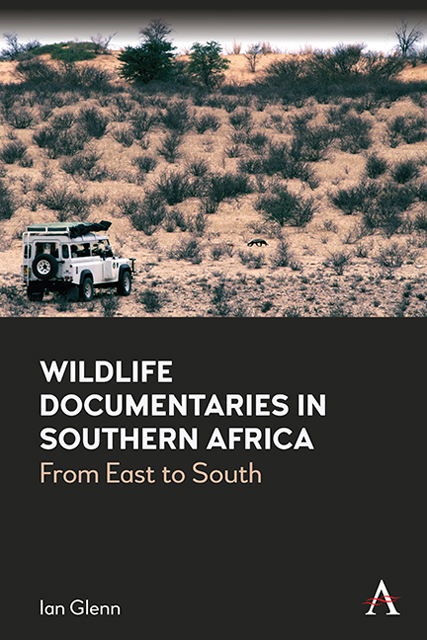Book contents
- Frontmatter
- Dedication
- Contents
- List of Figures
- Acknowledgements
- Introduction
- Chapter 1 What do the Critics Say?
- Chapter 2 A Theoretical Coalition?
- Chapter 3 Gone South: From East to Southern Africa
- Chapter 4 Private Lodges, Infrastructures and Guides
- Chapter 5 Going South: The Results
- Chapter 6 The Early History
- Chapter 7 The South Africans Enter the Game
- Chapter 8 Michael Rosenberg and Partridge Films
- Chapter 9 David and Carol Hughes
- Chapter 10 The Bartletts in the Namib, the Liversedges in Botswana
- Chapter 11 John Varty, Elmon Mhlongo and Londolozi
- Chapter 12 Richard Goss and Kim Wolhuter
- Chapter 13 Dereck and Beverly Joubert
- Chapter 14 Other Major Contributors
- Chapter 15 Going Live: Africam And Wildearth
- Chapter 16 Craig and Damon Foster
- Chapter 17 Must Love Animals?
- Chapter 18 The Social Turn
- Chapter 19 The Future of the Genre
- Chapter 20 The Influence of the Genre
- Conclusion
- Filmography
- Plates
- References
- Index
Chapter 7 - The South Africans Enter the Game
Published online by Cambridge University Press: 10 January 2023
- Frontmatter
- Dedication
- Contents
- List of Figures
- Acknowledgements
- Introduction
- Chapter 1 What do the Critics Say?
- Chapter 2 A Theoretical Coalition?
- Chapter 3 Gone South: From East to Southern Africa
- Chapter 4 Private Lodges, Infrastructures and Guides
- Chapter 5 Going South: The Results
- Chapter 6 The Early History
- Chapter 7 The South Africans Enter the Game
- Chapter 8 Michael Rosenberg and Partridge Films
- Chapter 9 David and Carol Hughes
- Chapter 10 The Bartletts in the Namib, the Liversedges in Botswana
- Chapter 11 John Varty, Elmon Mhlongo and Londolozi
- Chapter 12 Richard Goss and Kim Wolhuter
- Chapter 13 Dereck and Beverly Joubert
- Chapter 14 Other Major Contributors
- Chapter 15 Going Live: Africam And Wildearth
- Chapter 16 Craig and Damon Foster
- Chapter 17 Must Love Animals?
- Chapter 18 The Social Turn
- Chapter 19 The Future of the Genre
- Chapter 20 The Influence of the Genre
- Conclusion
- Filmography
- Plates
- References
- Index
Summary
Introduction
While several Southern Africans had tried to make films in the Kruger National Park and elsewhere in Southern Africa before the arrival of the Wild Kingdom and Survival teams, the successes and themes of the foreign crews seem to have spurred several local initiatives in the early 1970s – some with distinctly political motivations attached to them. In particular, the South African Department of Information saw the positive possibilities of wildlife conservation highlighting South Africa’s successes at a time when its trusteeship of South-West Africa was coming under increasing scrutiny.
Before 1974
In his summary of developments in the KNP before 1945, Stevenson-Hamilton commented that:
A number if [sic] very successful amateur films have been made on 16mm cameras by South Africans, Beyers, Woolf, &c and excellent stills by Lang and many others all which have been good publicity for the Park.
David Bunn has analysed ways in which some local insiders had privileged access to water-holes or prime viewing spots for photography (Bunn 2003), but when it came to film, the foreign professionals seemed to enjoy privileges that were resented by locals who complained, for example, that the Americans could use ‘skerms’ or hides whereas they were not allowed to.
Beinart and Coates state that the Kruger had made several films attacking elephant poaching, but I have found no trace of those (Beinart and Coates 2002). The most influential of the local amateur film-makers may have been influential as an example of what not to do! Michael Rosenberg speaks in an interview of how he watched his father filming at random and then struggling to compose anything coherent with his footage. His father’s experiences led Rosenberg to decide to do things differently and to shoot more purposefully, but had his father not experimented and got things wrong, Rosenberg may never have started filming and editing in the way he did.
Rhinos
If one judged the influence of documentaries by how the culture at large takes them up, particularly in feature films, then the rescue of the white rhino from extinction in the Natal (now KZN) Parks Umfolozi and Hluhluwe should have been a central theme.
- Type
- Chapter
- Information
- Wildlife Documentaries in Southern AfricaFrom East to South, pp. 91 - 116Publisher: Anthem PressPrint publication year: 2022



